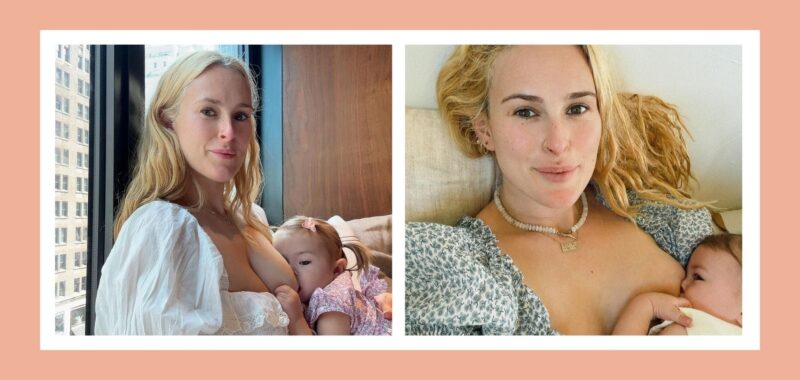
Rumer Willis recently made headlines when she posted an innocuous photo of her 17-month-old daughter receiving nourishment to Instagram, immediately sparking heated commentary about breastfeeding, about breastfeeding in public, and—in particular—about breastfeeding a child who is no longer an infant.
“Extended” breastfeeding is the term most often used to describe breastfeeding beyond the age of 12 months (although it’s worth noting that the American Academy of Pediatrics recommends breastfeeding to age two and beyond, so “extended breastfeeding” is really just “breastfeeding,” if you ask me, and I do wonder if the term contributes to some of the stigma that we too often see around breastfeeding past age 1. But I digress!).
Having nursed two children past the age of 2, I’ve been breastfeeding for the past 5 years and 2 months straight—so I’ve experienced firsthand what the comments on Rumer’s post demonstrate so clearly: People are going to have a *lot* to say about it if you choose to breastfeed a toddler.
Some are going to shame you and call it weird, and attention-seeking, and inappropriate (it’s none of the above). Some are going to celebrate you and tout all the health and emotional benefits (of which there are many!).
But people rarely talk about or prepare you for some of my favorite things about breastfeeding a toddler: the surprise benefits that bring unexpected depth and joy to this already sacred experience.
3 unexpected joys of breastfeeding toddlers
1. Breastfeeding a toddler is hilarious. It is the sweetest, most pure form of laugh-out-loud comedy and cuteness
By the time my first baby grew into a toddler, I thought I knew pretty much everything about breastfeeding; I was a pro, or so I thought, by that point! But nothing could have prepared me for the amount of laughter that would ensue when that baby turned into a small, opinionated person who could suddenly speak.
One of my kids once reached up to me, sippy cup in hand, and pushed it right below my breast to see if milk would come out. (“No, my breasts don’t work like our refrigerator’s water dispenser, babe, but that was a really smart experiment!”)
One of my kids brought a baby doll to a nursing session and explained that the doll was hungry, too, so could she please have a turn?
One of my kids once said, “I really like this milky, mama. I really like ya boobs!” (It still makes me laugh thinking about it now, but I also remember feeling like my heart would explode when my child expressed appreciation for my body. It was hilarious… and it was beautiful.)
2. Breastfeeding toddlers offers an interesting opportunity to teach physiology and anatomy
When one toddler first asked me where the milk came from, we pulled up a diagram of the breast’s milk ducts on Google and had a meaningful conversation about some of the incredible things that happen below our skin. Through that discussion, I could tell that a deeper understanding of physiology really “clicked” for my kid; we talked about how our bodies are constantly doing work to keep us alive and healthy—even when we can’t see it. (It led to my child wanting to learn even more about how our bodies work, so we started studying up with this lift-a-flap book.)
3. Breastfeeding a toddler is a natural way to introduce consent and respect
Look, I think breastfeeding a toddler is priceless and profound and all, but… it can also be really frustrating. Kids test limits; they might nip, twist, bite. They might try to pull up your shirt in public. You may, at times, feel touched out—and that’s valid, and it’s OK, because breastfeeding a toddler is also a great way to teach kids the concept of consent.
I’ve made it a point to teach my children that even though I choose to share my body with them, it’s still *my* body—and I get to say when it’s OK for them to touch me. I get to say what kind of touch is OK with me. I get to tell them when they need to stop. And I’ve taught them that their bodies—and all bodies—deserve the same respect in return.
We need to keep normalizing all feeding journeys
But here’s the most important thing to know about breastfeeding a toddler: You don’t need these reasons, or any reason, to do it; or you don’t need to do it at all. Parents choose to feed their children in all different ways, and all those choices are valid, so long as they are safe and work for that particular family. The conversation around Rumer’s beautiful photograph reminded me, once again, that our society has so much work to do when it comes to supporting mothers, parents and families—and I’m grateful to Rumer for bringing attention to it.
This story is a part of The Motherly Collective contributor network where we showcase the stories, experiences and advice from brands, writers and experts who want to share their perspective with our community. We believe that there is no single story of motherhood, and that every mother’s journey is unique. By amplifying each mother’s experience and offering expert-driven content, we can support, inform and inspire each other on this incredible journey. If you’re interested in contributing to The Motherly Collective please click here.

